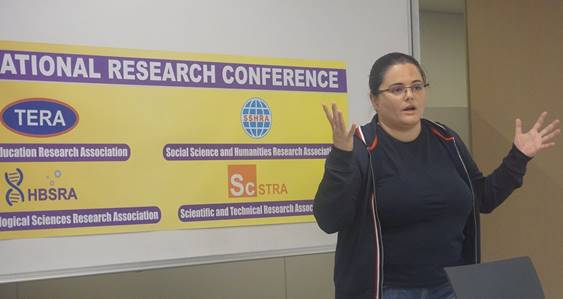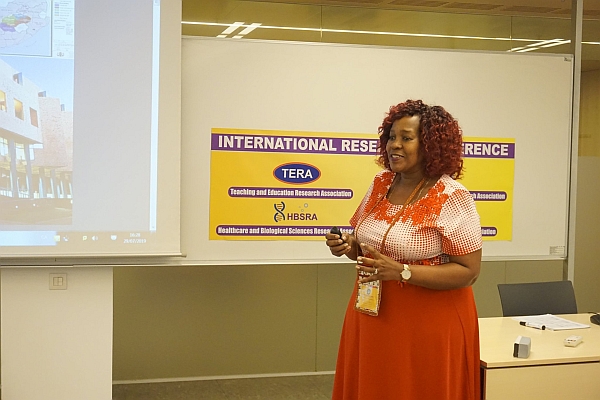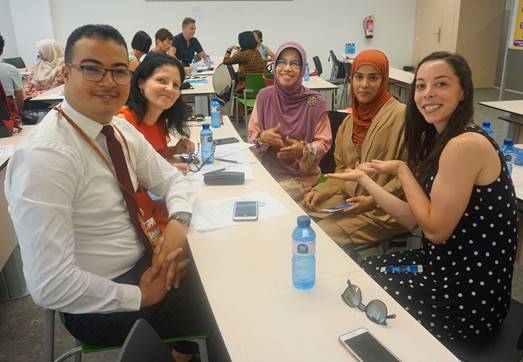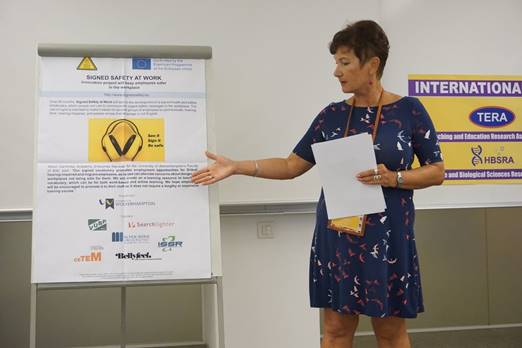The Benefits of ICTEL Conference 2019 in Dissemination of Inspiring Ideas in Teaching and Learning
Přínosy konference ICTEL 2019 při šíření inspirativních myšlenek v oblasti výuky a učení
Alena Horáčková1, Irena Kuhnová1
1 Výzkumný ústav bezpečnosti práce, v. v. i. horackova@vubp-praha.cz; kuhnova@vubp-praha.cz
Abstract
The ICTEL 2019 International Conference was attended by a great number of education experts. Lectures covering a wide range of issues in this field were presented here. The article brings a commented overview of selected conference presentations.
Keywords: Education, Teaching, Learning, Conference
Abstrakt
Mezinárodní konference ICTEL 2019 se zúčastnila řada odborníků z oblasti vzdělávání. Byly na ní předneseny příspěvky zahrnující široké spektrum otázek z této problematiky. Článek přináší komentovaný přehled vybraných konferenčních vystoupení.
Klíčová slova: vzdělávání, výuka, učení, konference
About the conference
The 14th ICTEL 2019 – International Conference on Teaching, Education & Learning was held on 29-30 July in Barcelona.
The organiser was the Eurasia Research which provides professional conference and management services to scholarly associations, institutions and professional bodies. Eurasia Research is working in MICE (Meetings, Incentives, Conferences, Exhibitions) industry for nearly a decade. Eurasia Research has organized several successful international conferences, workshops, and training programs, at various reputed institutions and grand venues. The 14th ICTEL conference was organized in cooperation with TERA.
 TERA (Teaching and Education Research Association) is a community of passionate researchers, practitioners and educationists for the development and spread of ideas in the field of teaching and learning. TERA aims to bring together worldwide researchers and professionals, encourage intellectual development and providing opportunities for networking and collaboration. These objectives are achieved through academic networking, meetings, conferences, workshops, projects, research publications, academic awards and scholarships. The driving force behind this association is its diverse members and advisory board, who provide inspiring ideas and research contribution. Scholars, Researchers, Professionals are invited to freely join TERA and become a part of this ever growing network, working for benefit of society and research with the spirit of sharing and mutual growth. TERA has now grown to 4528 followers and 2817 members from 45 countries. TERA is promoted by Eurasia Research.
TERA (Teaching and Education Research Association) is a community of passionate researchers, practitioners and educationists for the development and spread of ideas in the field of teaching and learning. TERA aims to bring together worldwide researchers and professionals, encourage intellectual development and providing opportunities for networking and collaboration. These objectives are achieved through academic networking, meetings, conferences, workshops, projects, research publications, academic awards and scholarships. The driving force behind this association is its diverse members and advisory board, who provide inspiring ideas and research contribution. Scholars, Researchers, Professionals are invited to freely join TERA and become a part of this ever growing network, working for benefit of society and research with the spirit of sharing and mutual growth. TERA has now grown to 4528 followers and 2817 members from 45 countries. TERA is promoted by Eurasia Research.
For this conference around 95 Participants from around 13 different countries have submitted their entries for review and presentation.
Findings from selected presentations
The conference was open by Ana Sofia Saldanha, professional translator, university lecturer in Universidade Autónoma de Lisboa (Portugal) and Mentor in the Portuguese Translators`Association (APTRAD). She has been interested in Mentoring since 2015 as it is a very good tool for future-to-be-translators to start a career in Translation. She is interested in the Mentoring theme and she has been delivering communications around the world regarding this theme.

Mentoring is a method that is nowadays often used instead of regular education and that is growing in popularity. It is a professional relationship of two people, when the mentor transmits his experience and knowledge to the mentee. It is used to transfer and develop not only professional but also soft skills including managerial skills. The mentor thus acts as a guide in a specific area or topic and helps the mentee to find the right direction or solution. The transfer of knowledge and skills usually takes place in a natural environment - for example in the workplace - and quite often mentoring focuses on career development or career change. According to Ana Saldanha, mentoring is a very effective tool which works with almost 100% efficacy. Its results are powerful and positive, both for the Mentor and for the Mentee who start a career. Mentoring as a discipline incorporates features such as: Motivation, Expectation, Knowledge, Humbleness, Enthusiasm, Commitment, Willingness, Experience, Adequate Skills (regarding the working area), Adequate Training, Personal Skills, among others. Motivation is a central feature of Mentoring. And Ana adds: Motivation, as it is, has the following advantages: improves persistence and effort; improves initiative; improves cognitive processing skills and improves overall performance. With persistence, effort, initiative, specific skills and an adequate performance, professionals would have the will and the strength to start a career/make a change in a career. Unfortunately, however, these features are lacked and were not adequately developed during their studies and this is a barrier to develop themselves as persons and as committed professionals.
Mentoring is about orientation and help. Mentoring is share experiences and mentoring is advice. Mentoring is a tool which helps to pass a certain massage, based on the Mentor´s real experience and not some theoretical advice which anyone can read from the books.
A large number of lectures were given during the conference, in the following text we present only a selection of some of them.
Information and Communication Technology (ICT) Facilities and the Management of Higher Institutions in Benue State
Yawe Aernan Athanasius, PhD
Department of Educational Foundations, Benue State University, Makurdi, Nigeria
Ivagher Ezekiel Dondo, PhD
Department of Educational Foundations, Benue State University, Makurdi, Nigeria
This study investigated impact of Information and Communication Technology (ICT) gadgets on the management of public higher institutions in Benue State, Nigeria. Two research questions and two hypotheses guided the study. Descriptive survey research design was employed for the study. The population of the study comprised 6,805 academic staff from 3 in Benue State. A sample of 408 academic staff was selected from 5 pubic higher institutions of learning using stratified random sampling technique. A 10-item structured four-point rating scale questionnaire titled “Information and Communication Technology (ICT) Facilities Questionnaire (ICTFQ)” with reliability coefficient of 0.76 was used for data collection. Data obtained from the field study were analyzed using descriptive and inferential statistics. Mean and standard deviation were used to answer the research questions while the Chi-square (χ2) test of goodness of-fit was used to test the null hypotheses at 0.05 level of significance. The findings indicated that e-mail and projectors has significant influence on the management of higher institutions in Benue State, Nigeria. It was recommended among others that Government should ensure the use of ICT gadgets among academic and non-academic staff so as to enhance effective and efficient management of their institutions.
Design, Implementation, and Outcomes of a Peer Observation Process at Tertiary Level: A Peer Observation of Teaching Case
Volkan İnceçay
School of English Language, Acibadem University, Istanbul, Turkey
Richard Sidgwick
Kenan Dikilitaş
Peer observation of teaching has not become a common practice in higher education institutes in Turkey though its beneficial results have been increasingly reported in other countries where it has been a usual procedure. With this in mind, this article describes the design, implementation, and outcomes of a peer observation process in a language school at a private university in the spring semester of 2018-19 in Istanbul, Turkey. In a one-day preparatory workshop designed and offered by an educational developer (an outside expert) with experience in harmonizing peer observation programs, a native and a non-native English language instructor were paired up. Then, these two instructors observed each other’s classes for three rounds. The study gathers its data from the participants’ notes kept during observation sessions, transcripts of post-observation meetings, and the participants’ reflective diaries. Suggestions for future implementations, insights to the complexity of the phenomenon, and practical implications for further research are provided.
Closing the Deal in Spanish
Jose Miguel Lemus
Modern Languages, Creighton University, Omaha, Nebraska, USA
Nowadays 53 million people speak Spanish in The United States. It is estimated that Hispanics hold a $1.7 trillion dollars in purchasing power. If the Latinos in the U.S. were a separate country, their economy would be the 7th largest in the world. The Latinos are the ethnic group with the fastest rate of business creation in America, including whites.
With all these facts about a vibrant and changing economic reality, it is obvious the need for a Spanish course specialized in business. This presentation is in the area of Spanish for the professions.
During the last years, Jose Miguel Lemus have been teaching Spanish and Business at Creighton University. The goal of this presentation is to describe the best (and some worst) practices and resources in teaching Spanish for entrepreneurship purposes in the US. Here, he reviewed briefly the most common mistakes found in textbooks in the field; he described the importance of creating a hands-on class; and, he offerred testimonies of students on their own business created as required for this class.
A Study on the Impact of Social Networks on Children in a Primary School
Imene Belalouache
Systeme Informatique, Primary School Thafath, Bejaia, Algeria
The Internet and especially social networks have been phenomenally successful in recent years and they affected, particularly, teenagers and even children. But this success has a price: it is the risks that accompany this phenomenon which can be very dangerous for children. Instead of letting children manipulate the internet and more particularly social networks, a study was devoted to pupils from a primary school to teach them how to manipulate community pages, to know the risks and to protect themselves. It is better to treat the problem in childhood than to leave it for teenage years knowing full well that parents or even the school is more likely to lose control. From this study, rules of use were proposed, tested and then disclosed to all students of this school but also to their parents. The participating pupils were able to create and access in a, more or less, secure way a community page that served them to develop group projects for the school. They were also able during the proposed activities to become familiar with the privacy settings and their importance. They had to deal with hacks led by the teacher to which they reacted. Of course there is always a risk, but the result of this study is to be sure that kids have at least understood the risks, know how to protect themselves and how to use these social networks differently and in a more useful way than a "wild" use. This study was conducted on a particular social network "Facebook" but the proposed rules can be applied to other social networks and more generally to Internet.
Speaking Anxiety in Adolescent and Adult English Learners Comparative Study
Boguslawa Gosiewska Turek
Department of English, Faculty of Applied Linguistics, University of Opole, Poland
The aim of the presentation is to investigate the interdependence between adolescent and adult students’ anxiety and their foreign language speaking achievements. It has been proved that there is no correlation between adolescent learners’ anxiety and their speaking attainments in a foreign language. Moreover, there is a weak correlation between adult students’ anxiety and their speaking achievements.
Method: The author of the study employed a quantitative research and the data was collected from anxiety questionnaires completed by the students and from achievement sheets filled in by the English teacher based on five-minute speeches performed by adolescent and adult students.
According to the research results there is no interdependence between adolescent students’ anxiety and their speaking attainments and the correlation between adult students’ anxiety and their speaking achievements is weak. Nevertheless, a number of other studies revealed the interdependence between students’ anxiety and their speaking attainments. Therefore, limitations of the study should be born in mind, and the results of the following study can be applied only to the subjects participating in the study. Hence, it is relevant to repeat the study with larger samples of subjects.
South African Social Sciences Teachers’ Perceptions of Good Citizenship in the Early 21st Century
Sonja Schoeman
Department of Curriculum and Instructional Studies, University of South Africa, South Africa
The notion that South African public schools has a distinctively civic mission has been recognized in all national education policy documents published since the first democratic election in 1994. The ANC government immediately realized that if the new-found democracy was to survive, it was necessary to transform the social order according to the human rights philosophy of Ubuntu, and the teaching of the school subject Social Sciences. Given William’s system of historical dating (as quoted in Parker, 2015:5), the purpose of the paper is to report scholars’ views on the attributes of a good citizen in eC21, and the outcomes of a qualitative intrinsic case study of Social Sciences teachers’ perceptions of the characteristics of a good global citizen. Finding out wat these teachers thought, would provide a reasonable starting point to address the issue of global citizenship education in South African public schools. Given the above, the theoretical perspective of the study was post-positivism. The information was gathered by means of individual one-to-one interviews, and analysed using content analysis and a priori coding. The participants held a conservative view of citizenship and citizenship education. Schugurensky and Myers’ (2003:3-6) seven proposals for twenty-first century citizenship education were put forward to promote the progressive orientation to citizenship education in South African Social Sciences classrooms.

Engaging Students at Higher Education Institutions: The Case of a University of Technology in South Africa
Dr. Rosaline Sebolao
Centre for Innovation in Learning and Teaching (CILT), Central University of Technology, South Africa
Ms N Mphumela
Central University of Technology (CUT), Free State
Prof SN Matoti
Central University of Technology (CUT), Free State
This case study was undertaken to examine the extent to which lecturers use instructional strategies to engage students in their classrooms at a particular institution of higher learning in South Africa. The study was underpinned by Pittaway’s theory of engagement and Schon’s concept of reflective practice. The sample comprised of 60 lecturers from an institution of higher learning. A questionnaire was used to collect data from the lecturers using question pro. The responses were measured on a six-point Likert scale ranging from 0-5. Quantitative data analysis was followed and both descriptive and inferential statistics were generated. It was found that the level of engagement of students by the lecturers ranged from low to moderate. This implies that lecturers need to expose students to more challenging teaching and learning activities such as problem-based learning.

Going Beyond the Surface: Student Centred Classrooms with the Academic, Social, Emotional and Behavioral Structures for Success
Raven Roytblat
Educator, International School of Sanya, Sanya, China
Many teachers, especially those who come from pedagogical and cultural backgrounds where the teacher was traditionally considered the leader and focal point of the classroom, are having difficulty transitioning to the learner or student-centred approach to teaching and learning. Often school leadership which has not received sufficient training is charged with the task of leading teachers to an unclear destination, with few resources, and even less support.
By giving teacher and school leaders a clear understanding of what student-centred leadership is and is not, as well as some basic, but critical tools for success, a shift in teaching can occur that is academically sound yet reaches the social and emotional needs of the students and supports the long-term goals of the school community.

Poster session
Within others lectures, our institute presented to the audience a new project „SIGNED SAFETY AT WORK“, which is focused on education in quick visual communication. The project will create a system of sign language based on international and international sign language, which will be able to mediate health and safety information. What to do in case of an emergency makes workers (for example at noisy workplace) feel more confident, comfortable and safe. The employers gain better communication with the employees, and they get happier workers, who know what to do in an emergency. The workers then trust their employer more. And as a result there will be a reduced risk of incidents and injuries.
The poster, leaflets were distributed and a short introduction was presented.

Vzorová citace
HORÁČKOVÁ, Alena; KUHNOVÁ, Irena. The Benefits of ICTEL Conference 2019 in Dissemination of Inspiring Ideas in Teaching and Learning. Časopis výzkumu a aplikací v profesionální bezpečnosti [online]. 2019, roč. 12, č. 3-4. Dostupný z: https://www.bozpinfo.cz/josra/benefits-ictel-conference-2019-dissemination-inspiring-ideas-teaching-and-learning. ISSN 1803-3687.
Užitečné odkazy
Provozovatel portálu
Jeruzalémská 1283/9
110 00 Praha 1


